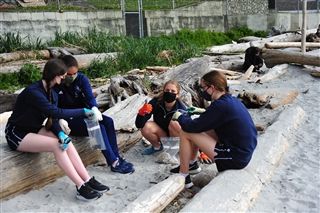On Wednesday, April 28, some of the Grade 9s went on a beach cleanup at Gonzales Beach. Led by Senior School Round Square members Sophie Davies ’24 and Sienna Wharton ’24, nearly two dozen Grade 9s made their way to the beach with buckets, bags and gloves in tow.
Walking down the ramp that leads to Gonzales, participants saw a sandy beach with sunlight dancing off the rippling water. The sands transition from being dry and fluffy to dense with a soft ruffled pattern, a result of the retreating tide. Mother Nature may have been happy with the work being done, pulling back the tide to reveal more ground for us to work with.
At first glance, there was no garbage to be seen, but as the Grade 9s began fanning out along the beach and digging deeper into the sand, the underlying threat of microplastics became more apparent.
At the cleanup, Ms. Sarah McKerlich, Round Square Coordinator, gave everyone her one minute long ‘knargles’, also known as ‘nurdles,’ or microplastics lessons. These microplastics are defined as tiny pieces of plastic that are less than five millimeters in length. With their tiny size, they don’t seem like much of a threat, but as Ms. McKerlich explains, size doesn’t matter, as the damage done by microplastics are not proportional to their size. They cause damage that travels up the food chain all the way to humans.
“Cleaning up the beach will help prevent microplastics from being carried into the ocean, therefore decreasing the amount of harm that could be done to the animals living in the ocean and around the beach,” explained Sophie.
Sienna echoed the sentiment of why it’s important to clean the beaches as it affects us all.
“Research shows that microscopic plastic fragments that collect in the ocean have contaminated drinking water, meaning there has been plastic in the water that people consume,” she said. “Picking up plastic at Gonzales beach may not seem like it would have a significant effect but small things add up.”
If you have been inspired by the stellar work of the Grade 9s, just like the Grade 10s—who are organizing their beach cleanup, date to be determined—and are interested in doing your part for the environment and preserving the ocean ecosystem to which we are intricately tied to, feel free to contribute. Contributions can be as simple as raising awareness, bringing a bucket and being on the lookout for tiny ‘knargles’ the next time you go to enjoy the beach. As Sophie wisely encourages, “Participate in beach-clean ups or other events of the sort whenever you can,” as every little bit helps.
“Almost as impactful as the clean-up itself is the awareness spreading to more people about the effect of microplastics on the environment; the effect being its entangling and toxifying marine organisms,” Sienna adds.





